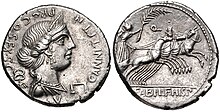Anna Perenna
Anna Perenna (in Latin perennis annually or constantly recurring) is one of the many "little" goddesses of ancient Rome . Probably (after Franz Altheim ) it comes from the Etruscan mythology , where it represented an earth mother goddess , and was adopted by the Romans.
Anna Perenna was honored on March 15th with a general feast in her grove on the first milestone of the Via Flaminia ( Feriae Annae Perennae ), during which there was apparently plenty of drinking. One wished for as many years of life as one succeeded in drinking cups, one danced and sang whatever one knew, but above all obscene songs.
According to one of the stories told by Ovid , the festival goes back to an old woman named Anna from Bovillae , who brought home-baked cakes to the starving plebeians every day during the class battles between patricians and plebeians, thus saving them from starvation. These aeschrologies , the singing of obscene songs at the festival, go back to a trick that the just deified Anna played on the god Mars : Mars was in love with the chaste Minerva and asked Anna for coupler services . At first she held him out and when that was no longer possible, she presented herself to him as a bride-to-be Minerva. The rude jokes at the feast would be a reminder of that successful trick Anna had played on the god of war.
Alternatively, Ovid identifies Anna Perenna with Anna , Dido's sister .
In 1999 the fountain of Anna Perenna in the Piazza Euclide in Rome was discovered and excavated by Marina Piranomonte.
literature
- Otto Meltzer : Anna 1 . In: Wilhelm Heinrich Roscher (Hrsg.): Detailed lexicon of Greek and Roman mythology . Volume 1.1, Leipzig 1886, Col. 355-360 ( digitized version ).
- Georg Wissowa : Anna 3 . In: Paulys Realencyclopadie der classischen Antiquity Science (RE). Volume I, 2, Stuttgart 1894, Col. 2223-2225.
- Otto Immisch : The grove of Anna Perenna. In: Philologus 83, 1928, pp. 183-192.
- Fritz Graf : Anna Perenna. In: The New Pauly (DNP). Volume 1, Metzler, Stuttgart 1996, ISBN 3-476-01471-1 , Sp. 708.
- Gwynaeth McIntyre, Sarah McCallum (Eds.): Uncovering Anna Perenna: A Focused Study of Roman Myth and Culture. Bloomsbury Academic, London, New York 2019.
- Marina Piranomonte: Il santuario della musica e il bosco sacro di Anna Perenna. Electa, Rome 2002.
Individual evidence
- ↑ Michael Crawford : Roman Republican Coinage . Cambridge 1974, No. 366 / 1b.
- ↑ Martial 4, 64, 16; Macrobius Ambrosius Theodosius Saturnalia 1, 12, 6; Ovid Fasti 3: 523-540.
- ↑ Ovid Fasti 3, 657-674.
- ↑ Ovid Fasti 3, 675-696.
- ↑ Ovid Fasti 3: 545-656.
